


According to the population census 2011, India had a total youth population of 325.2 million, which is 35% of the total population. Out of this, about 70% were rural youth and the remaining 30% were urban youth. In India, since the majority of the youth comes from rural areas, they are considered as the nation builders of tomorrow. Unnat Bharat Abhiyan recognized the momentum of the caliber this part of the population possesses and planned various UBA activities at villages adopted by IIT Kanpur to encourage and empower the future of tomorrow.
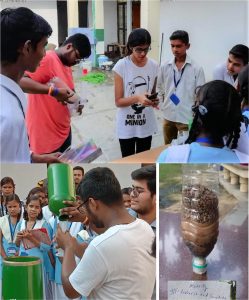
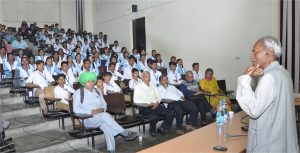
Students attending a talk by Padam Shree Dr. Subhash Palekar at the IIT Kanpur auditorium on Natural Farming
Citizen Science is an absolutely new program and untested one for this region. Its success depends on the participation of students. The effort is to get them excited about science and render them skills to learn about water and soil. In the initial phase, experiments are set up at the school and students are asked to bring water and soil samples from their homes/fields/neighbourhood. Students conduct the experiments and make measurements. In the next phase, more topics are planned out, such as using a foldscope to look at bacterial load. Once sufficient data is collected, data analysis and presentation will be taught. The school children will organize community meetings to discuss the soil, water, and related issues.See the course structure and full report here Way Forward The school is issued a set of early usable instruments and methods for collecting data on rainfall, temperature, groundwater levels, surface water levels, water quality, and soil moisture. The UBA team visits the High School every Saturday and spends 2 hours with the children doing low-cost science experiments along with them.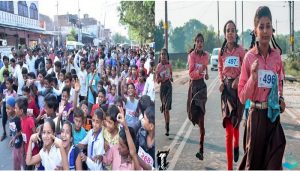
Children showing enthusiasm and participating in Grameen Marathon
Marathon filled the villages with enthusiasm for sports. As a consequence of high enthusiasm and great response shown by the rural youth during the Gramin Sports program, UBA-IITK has now started regular sports activities for rural youth. A group of 40 young boys and girls have been shortlisted, and they come to the IITK field to practice every day. Till the time, sports facilities come up in the village, these potential sportspersons will not be deprived of practice. The group of youngsters was taken to Green Park stadium to take part in District OpenAthletics Championship. The idea was to give them exposure and enthuse them to practice regularly. It came as a happy surprise to the UBA team that Neha and Anjali won Silver and Bronze Medals.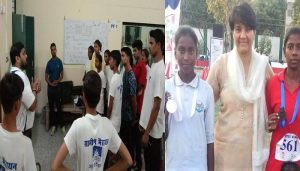 Training under coaches of IITK (left), Neha and Anjali after winning the 800 mt track event at District Athletic Championship (right)
Way Forward
The effort of UBA IITK will be to further the growth of boys and girls with sporting talents. Once the children are picked up at a younger age, sponsorships could be sought for their education. We will be fostering the employability of young people, and get them to the training centre where they could get exposure and training.
Training under coaches of IITK (left), Neha and Anjali after winning the 800 mt track event at District Athletic Championship (right)
Way Forward
The effort of UBA IITK will be to further the growth of boys and girls with sporting talents. Once the children are picked up at a younger age, sponsorships could be sought for their education. We will be fostering the employability of young people, and get them to the training centre where they could get exposure and training.
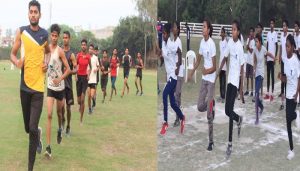
Regular field practice at IITK grounds.
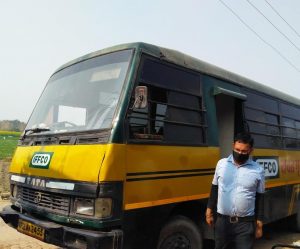
For understanding the soil condition, soil tests were done on 62 farms of the Saksi Purwa village, with the help of the Indian Farmers Fertilisers Cooperative (IFFCO). The results were shared with the farmers along with advisories. It was an eye-opener for farmers that nearly one-third of the samples had organic carbon below 0.3 percent. The could see that modern agricultural practices have led to the loss of fertility as to maintain the same yield, more and more chemical fertilizer needs to be applied every year.
Pilot of on-farm composting and trials on organic farming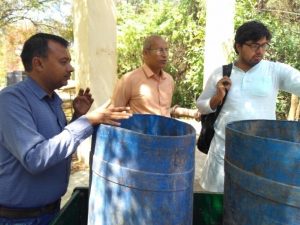
On-farm composting was introduced using drum composting to convert farm and animal waste into a useful farm resource. The pilots of organic farming were conducted with 14 farmers of Saksupurwa in April-December 2018 and the results were quite encouraging. After one cropping season, the farmers reported enhanced yield, lower attack of pests and softening of soil. Some also reported an increase in the number of earthworms in the soil. For organic farmers, there is a reduction in the cost of cultivation as they save on expensive chemical fertilizers and pesticides.
Since early 2018, IITK has started garbage segregation drive at source, and UBA IITK has played a partnership role with the sanitation team of the institute. Volunteers of UBA went door-to-door creating awareness and distributing dustbins for biodegradable waste.
                                        Training and technological Interventions

With the help of agriculture scientists, new crop varieties are getting introduced in the village. Indian Institute of Pulses Research introduced gram, peas, and moong bean, and shared information about the good practices. Farmers have realized good profits and are saving seeds for the next crop. The area under pulse cultivation is increasing rapidly. Demonstration of Drip Farming     Â
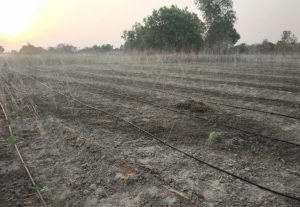
Jain Irrigation, on request of UBA IITK, set up a demonstration farm to showcase laserjet and drip irrigation technologies on nearly 0.4 hectares of land in Baldeopurwa village. A farmer meet was organized to showcase the technology (May 2019).
Marketing Interventions
Intervention in the agriculture sector does not gain momentum until the produce of farmers does not fetch the market, and gives him a good price realization. Keeping this in mind, several initiatives have been undertaken. To start with the local indigenous variety of Bael and Guava have been selected for marketing through Amazon in partnership with Aranyani. Farmers who got Rs 12 for a bael fruit fetched Rs 40 per piece. Agnys, a start-up at IIT Kanpur, has been provided a testbed to develop market linkages between farmers and consumers. A farmer haat was set up for two days at IIT Kanpur that brought produce from over 25 farmers of UBA and nearby villages.
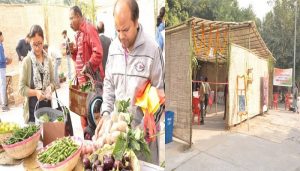
Marketing interventions by UBA at rural areasWay Forward
While efficient agricultural practices and new approaches such as organic farming and natural farming have been around for a while now, a lot of work remains to be done in skilling the agricultural workforce to gain more acceptance for experimentation to enable the next agricultural revolution. At UBA IIT Kanpur, we are trying to create the right support system for the same and are eagerly awaiting the results of our endeavours. (For more information on Natural Farming Program, click here